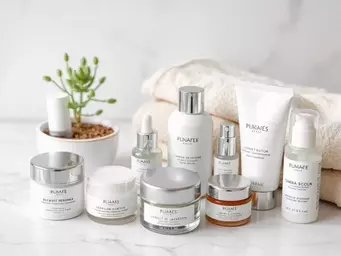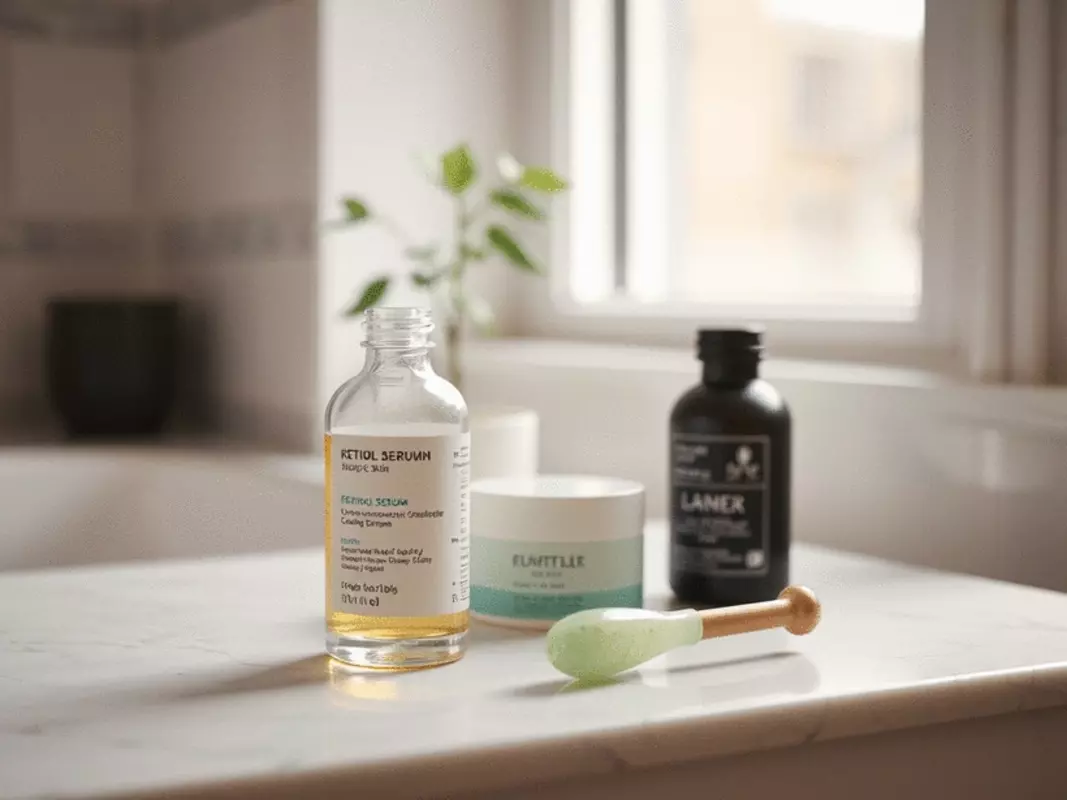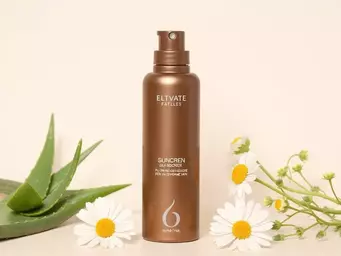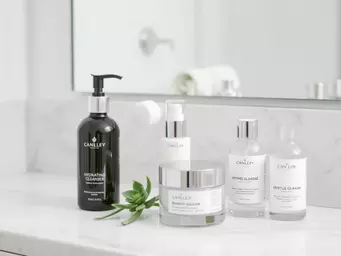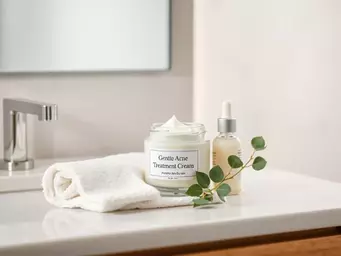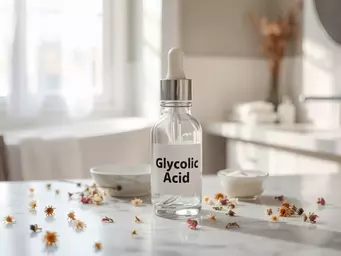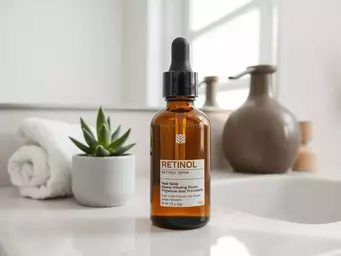Retinol for Dry Acne Skin
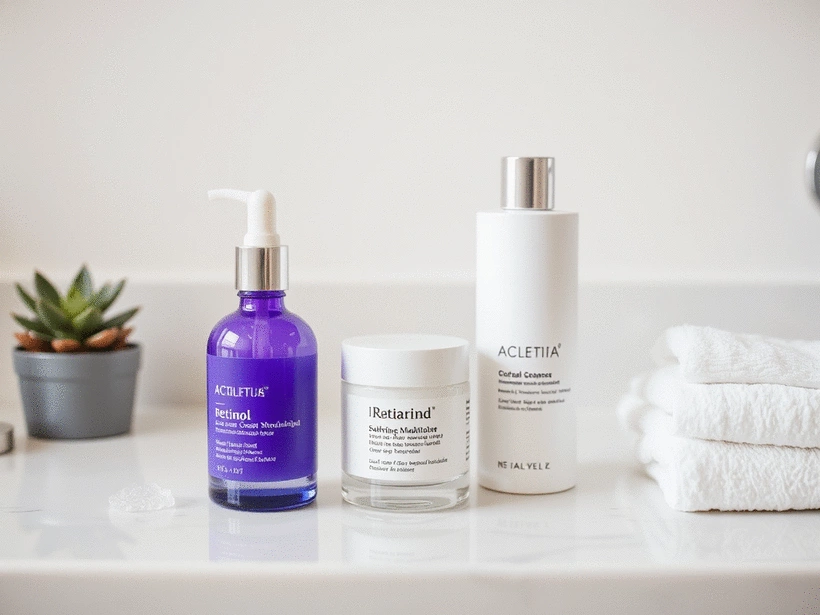
What if one ingredient could tackle both dryness and acne-prone skin effectively? That’s the promise of retinol—a powerful ally in your skincare arsenal. Let's explore how to harness its benefits!
What You Will Learn
- Retinol enhances cellular turnover, helping to clear dead skin and prevent acne.
- This powerhouse ingredient also improves skin texture, reducing fine lines and enhancing tone.
- For dry, acne-prone skin, retinol can clear marks, boost hydration, and offer anti-aging benefits.
- To minimize irritation, start with a low dose at night and gradually increase usage.
- Always use sunscreen during the day, as retinol can increase sun sensitivity.
- Patch testing is crucial to avoid adverse reactions when introducing retinol.
Retinol's Dual Action: Benefits & Precautions for Dry, Acne-Prone Skin
Retinol is a powerful ally for managing dry, acne-prone skin, offering significant benefits when used correctly. However, understanding its potential side effects and necessary precautions is crucial for a successful skincare journey.
Key Advantages Benefits of Retinol for Dry, Acne-Prone Skin
- ✓ Promotes cellular turnover
- ✓ Clears acne marks & enhances tone
- ✓ Improves skin texture & radiance
- ✓ Provides anti-aging benefits
- ✓ Strengthens skin barrier
Important Warnings Precautions & Side Effects of Retinol Use
- ! Can cause initial dryness & irritation
- ! Increases sun sensitivity
- ! Requires gradual introduction (start slow)
- ! Needs consistent moisturizing
- ! Patch testing is recommended
Best Practices Incorporating Retinol Safely & Effectively
- ► Start with low dose, every other night
- ► Gradually increase frequency
- ► Always apply broad-spectrum sunscreen
- ► Pair with hydrating products
- ► Consult dermatologist for severe irritation
The Importance of Retinol for Managing Dry Acne Skin
Are you struggling to find the right balance between dryness and breakouts? Many of us face the dual challenge of dry, acne-prone skin, but retinol can be a game changer. As a derivative of vitamin A, retinol promotes cellular turnover, helping to clear away dead skin cells that can clog pores and lead to acne. For a deeper dive into the science behind retinoids and their impact on skin, you can refer to this comprehensive overview of retinoids.
Understanding how retinol works can transform your skincare routine! By boosting cell turnover, it helps to reveal fresher, healthier skin, making it an essential ingredient for anyone looking to manage dry acne.
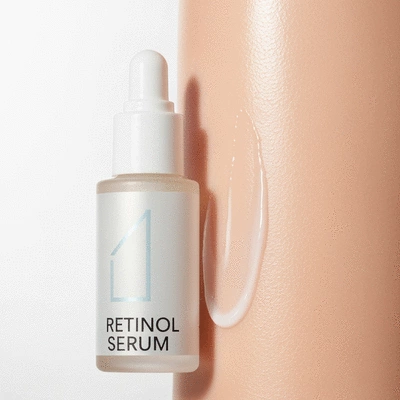
Understanding Retinol: What It Is and How It Works
Retinol is a powerhouse ingredient celebrated for its ability to enhance skin texture and clarity. It works by stimulating the production of new skin cells, which helps to fade acne scars and improve overall complexion.
- Promotes cellular turnover for clearer skin.
- Reduces the appearance of fine lines and wrinkles.
- Improves skin texture and tone.
This mechanism not only helps prevent breakouts but also aids in diminishing the signs of aging, making it a versatile option for those of us at different stages of our skincare journey.
Benefits of Retinol for Dry, Acne-Prone Skin
Let’s dive into the specific advantages of incorporating retinol into your routine. For individuals with dry, acne-prone skin, retinol offers:
- Clears acne marks and enhances skin tone.
- Improves skin texture, making it smoother and more radiant.
- Provides anti-aging benefits by promoting collagen production.
These benefits combined can lead to a significant improvement in your skin's overall health and appearance. With patience and consistent use, you’ll likely see transformative results! You can find more information on managing acne and its evolving treatments in this article on managing acne.
How Retinol Affects Skin Hydration and Barrier Function
Now, you might wonder how retinol interacts with skin hydration, especially if you're prone to dryness. While retinol is effective for treating acne, it can sometimes cause dryness and irritation, particularly when you first start using it.
- Boosts moisture retention when used correctly.
- Strengthens the skin barrier, enhancing its ability to retain moisture.
- Can lead to initial dryness, which may be mitigated through proper hydration.
To counteract any dryness, it’s essential to maintain a balanced skincare routine that emphasizes hydration. This way, you can enjoy the benefits of retinol while keeping your skin healthy and happy!
Navigating the Use of Retinol Safely
How to Incorporate Retinol into Your Skincare Routine
When introducing retinol into your routine, start slow! Begin with a low dose to allow your skin to adjust. It’s typically best to apply retinol at night—a key factor in maximizing its effectiveness while minimizing irritation.
- Start with a pea-sized amount, applying every other night.
- Gradually increase frequency as your skin builds tolerance.
- Always apply sunscreen during the day, as retinol can increase sun sensitivity.
Following these guidelines will help you reap the benefits of retinol while reducing the chance of irritation.
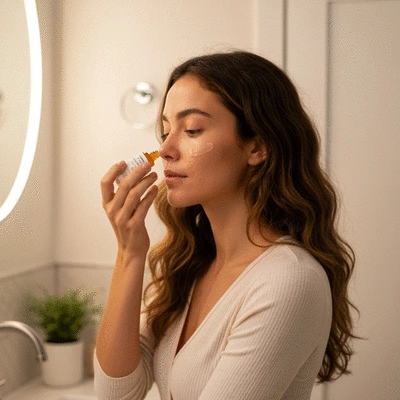
Common Side Effects and How to Manage Them
While retinol is beneficial, it can have side effects such as dryness, irritation, and increased sun sensitivity. Knowing how to manage these effects is crucial for maintaining healthy skin.
- Moisturize regularly to combat dryness.
- Consider using a gentle cleanser and avoid harsh exfoliants.
- Use a broad-spectrum sunscreen every day.
If you experience significant irritation, it might be time to scale back on usage or consult a dermatologist for personalized advice. Research continues to explore the therapeutic advancements in acne, which often includes strategies to mitigate side effects of potent ingredients like retinol.
The Role of Patch Testing Before Starting Retinol
Patch testing is a simple way to gauge your skin's sensitivity to retinol. Before applying it all over your face, test a small area to see how your skin reacts.
By patch testing, you can identify any adverse reactions early, allowing you to adjust your skincare routine without overwhelming your skin.
Pro Tip
To maximize the benefits of retinol while minimizing dryness, consider pairing it with a hydrating serum that contains hyaluronic acid. This will help lock in moisture and support your skin barrier as you introduce retinol into your routine.
Frequently Asked Questions About Retinol
Q: What is retinol and how does it help dry, acne-prone skin?
A: Retinol is a derivative of vitamin A that promotes cellular turnover, helping to clear dead skin cells that can clog pores and lead to acne. It also improves skin texture, reduces fine lines, and enhances skin tone, making it beneficial for both acne and dryness.
Q: What are the main benefits of using retinol for this skin type?
A: Retinol clears acne marks, improves skin texture, enhances radiance, and provides anti-aging benefits by promoting collagen production. It also strengthens the skin barrier, which can help with moisture retention.
Q: How should I start using retinol to avoid irritation?
A: Begin with a low-dose retinol product, applying a pea-sized amount every other night. Gradually increase the frequency as your skin builds tolerance. Always apply it at night and use sunscreen during the day.
Q: Can retinol cause dryness, and how can I manage it?
A: Yes, retinol can cause initial dryness and irritation. To manage this, moisturize regularly with hydrating products, use a gentle cleanser, and consider pairing retinol with a hydrating serum containing ingredients like hyaluronic acid.
Q: Why is patch testing important before using retinol?
A: Patch testing helps you determine your skin's sensitivity to retinol before applying it to your entire face. This can prevent widespread adverse reactions and allow you to adjust your routine as needed.
Q: Do I need to use sunscreen when using retinol?
A: Absolutely. Retinol increases your skin's sensitivity to the sun, making broad-spectrum sunscreen an essential part of your daily routine to protect against sun damage.
Summarizing the Role of Retinol in Acne Management
In this journey towards achieving clear and hydrated skin, we've explored the many facets of retinol and its critical role in managing dry, acne-prone skin. From understanding what retinol is and how it promotes cellular turnover to discovering its numerous benefits—like improving skin texture and reducing acne marks—it's clear that this vitamin A derivative is a powerful ally in your skincare routine.
As we've discussed, using retinol comes with important precautions to ensure safe and effective application. Proper incorporation into your skincare regimen, recognizing side effects, and maintaining skin hydration are vital steps in reaping the full benefits of retinol. Below is a brief recap of key points:
- Benefits: Improved skin texture, anti-aging properties, and reduced acne marks.
- Precautions: Start with low doses, monitor for irritation, and prioritize sun protection.
- Best Practices: Pair with hydrating products and consider patch testing to ensure compatibility.
Encouragement to Consult with a Dermatologist
As I always emphasize at Dry Acne Solutions, individualized care is crucial when managing dry, acne-prone skin. If you're ever unsure about how to use retinol or if you've experienced severe irritation, I encourage you to seek professional advice tailored to your needs. A dermatologist can provide invaluable insights and help you navigate your skincare journey safely and effectively.
Final Thoughts on Skincare and Retinol
Embracing retinol can be a game-changer in your skincare routine, but remember that patience is key. As you embark on this path, consistency in using retinol, combined with a comprehensive skincare strategy, can yield remarkable results. Your skin deserves the best care, and I’m here to support you every step of the way! Let’s celebrate the journey to healthy, vibrant skin together.
Recap of Key Points
Here is a quick recap of the important points discussed in the article:
- Benefits: Retinol improves skin texture, provides anti-aging properties, and helps reduce acne marks.
- Precautions: Start with low doses, monitor for irritation, and prioritize sun protection.
- Best Practices: Pair retinol with hydrating products and consider patch testing to ensure compatibility.
- Hydration: Maintain a balanced skincare routine to counteract potential dryness caused by retinol.
- Consultation: Seek professional advice if unsure about usage or experiencing severe irritation.
